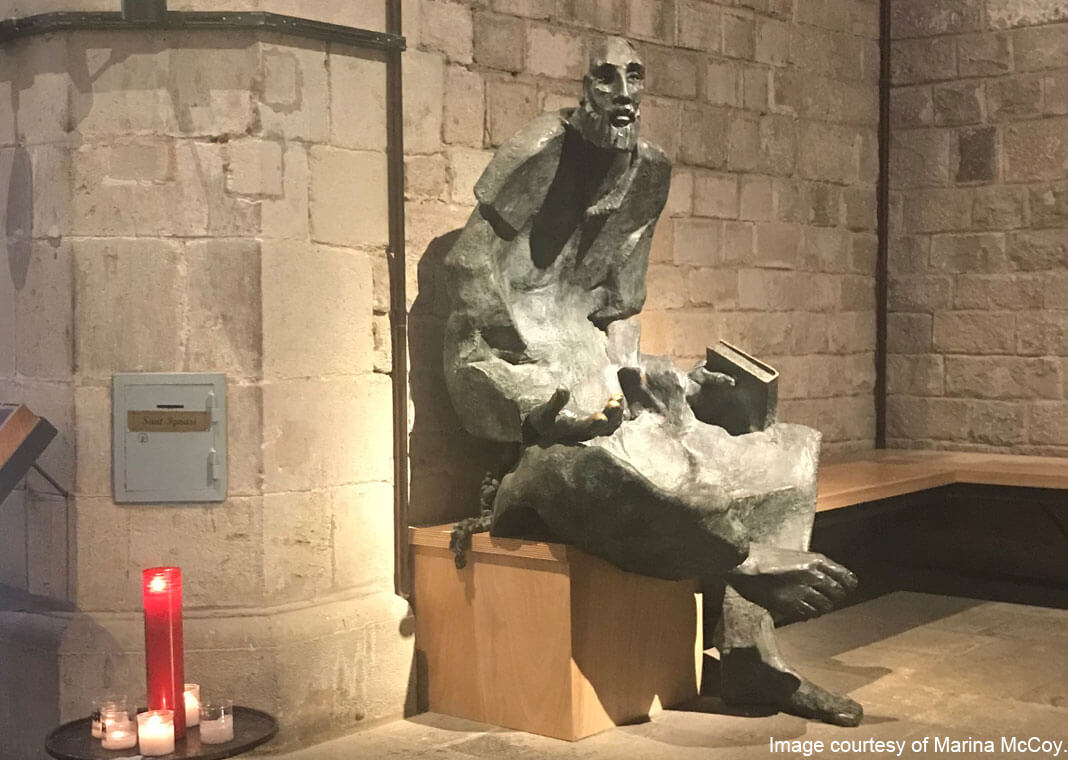
Last June, I traveled on a group pilgrimage to many places that were significant in St. Ignatius’s journey, including Manresa and Barcelona. Manresa, for Ignatius, was a place of solitude and an intense experience of a vivid and personal relationship with God, as well as service to the poor at a local hospital. Later, Ignatius went to Barcelona, from which point he planned to go and live in Jerusalem, as the destination of his pilgrimage. In Barcelona, which he saw as just a waiting point, Ignatius begged for money for his daily sustenance. At the end of the day, he would give away whatever remained to others, rather than hang onto it. Although Ignatius knew that he would require additional funds for his passage to Jerusalem, he gave away whatever he had at the end of the day, trusting in God to provide.
Eventually, Ignatius did embark on a ship to the Holy Land. But he was forced to return due to unrest in the Holy Land, nearly as soon as he had arrived! On my own pilgrimage, I joked with one of the group leaders: imagine what would happen if we were put on a plane to Jerusalem and told to expect time visiting the holy sites. But then as soon as we arrived and unpacked at the hotel, imagine we were told we had to go back and not stay for any planned activities! I can imagine a good deal of discontent. Ignatius argued, insisted, and resisted but eventually ended up back in Barcelona, where he studied Latin in preparation for the priesthood.
Learning to Trust
While I was already familiar with these parts of Ignatius’s story from reading his autobiography, my experience of pilgrimage brought home for me the ways that his mystical experiences at Manresa must have been deeply interconnected with his experience as a beggar and pilgrim there and in Barcelona. Ignatius was filled with the palpable experience of God, so present to him in the cave at Manresa. Perhaps it is really there that he learned to trust in God’s intimate, personal love and providence. Surely these graced moments of prayer provided a kind of “reservoir of love” and a trust in God’s abundant generosity to him, a trust that allowed him to give away all that he had—rather than to cling to wealth, honor, or any other good one might place above God. Ignatius gave himself away in service at the hospital in Manresa, and he gave himself away to others in Barcelona too. Even the records of his own spiritual experiences were ones that he gave away, as they were gradually developed into the Spiritual Exercises.
Movement from the Graces Received in Prayer to Generosity
This kind of movement from the graces received in prayer to generosity in ordinary life can apply to our own lives. Like Ignatius, we are all gifted in our own ways by God’s love and generosity. While how we pray or experience God, or what kinds of gifts and talents we receive, varies from person to person, God loves and knows each one of us intimately. At the same time, we are also all beggars who depend on God in our everyday lives, whether our lives feel enriched or impoverished at any given time. Ignatius provides a model for how we can generously give ourselves away to others.
Sometimes, I may indeed feel enlivened and empowered by God’s generosity to me and allow myself to rest in and soak up the goodness of the Lord. However, in those times when marriage, work, parenthood, service, or even prayer itself seems to leave me feeling like a bit of a beggar, I can still choose to respond in generosity in the rest of my life. Maybe a family relationship feels stressed and difficult for a time, but I can still try to be generous to my students in the classroom. Perhaps a given day of teaching did not go as well as I had hoped, but I can still try to be kind to the cashier as I buy lunch in the cafeteria. The truth is that God is constantly generous to us; the question is whether we are paying attention to its presence and are willing to be responsive to it through what we return in love to others that we meet this day.
Ignatius must have been so disappointed not to be able to stay in Jerusalem, but he eventually accepted that God had other plans for his life. We, too, don’t always get to “go to Jerusalem” but can trust that God is still laboring on our behalf. Ignatius’s trust in God and love for God remained steady, whether it was a time of plenty or of little. This trust was developed in both his experiences of personal prayer and generous living. Like Ignatius—both a mystic and a beggar—we are also invited to receive God’s gifts and to give away all that we are and have, season after season.

The message to me is :When things don’t go as I planned or hoped, let me remember that God is still working on my behalf.
What a lesson from St. Ignatius! Trust and obey God!
Sometimes it’s not easy to accept God’s “different” plans. But we learn that he always knows best.
I am working at the moment on acceptance and abandonment and praying.
gramswisewords.blogspot.com
Very lively and thought-provoking stuff. Thanks a lot Marina. You give up something here, there and everywhere, and you are rewarded or even burdened with much more than you can manage. Truly, nothing to beat our good old Ignatius.
Inspirational and opened my heart and mind to see deeper into Ignatius Spirituality.
Absolutely Ignatian! And the perfect reading recipe for me today. Thank you for your insights.